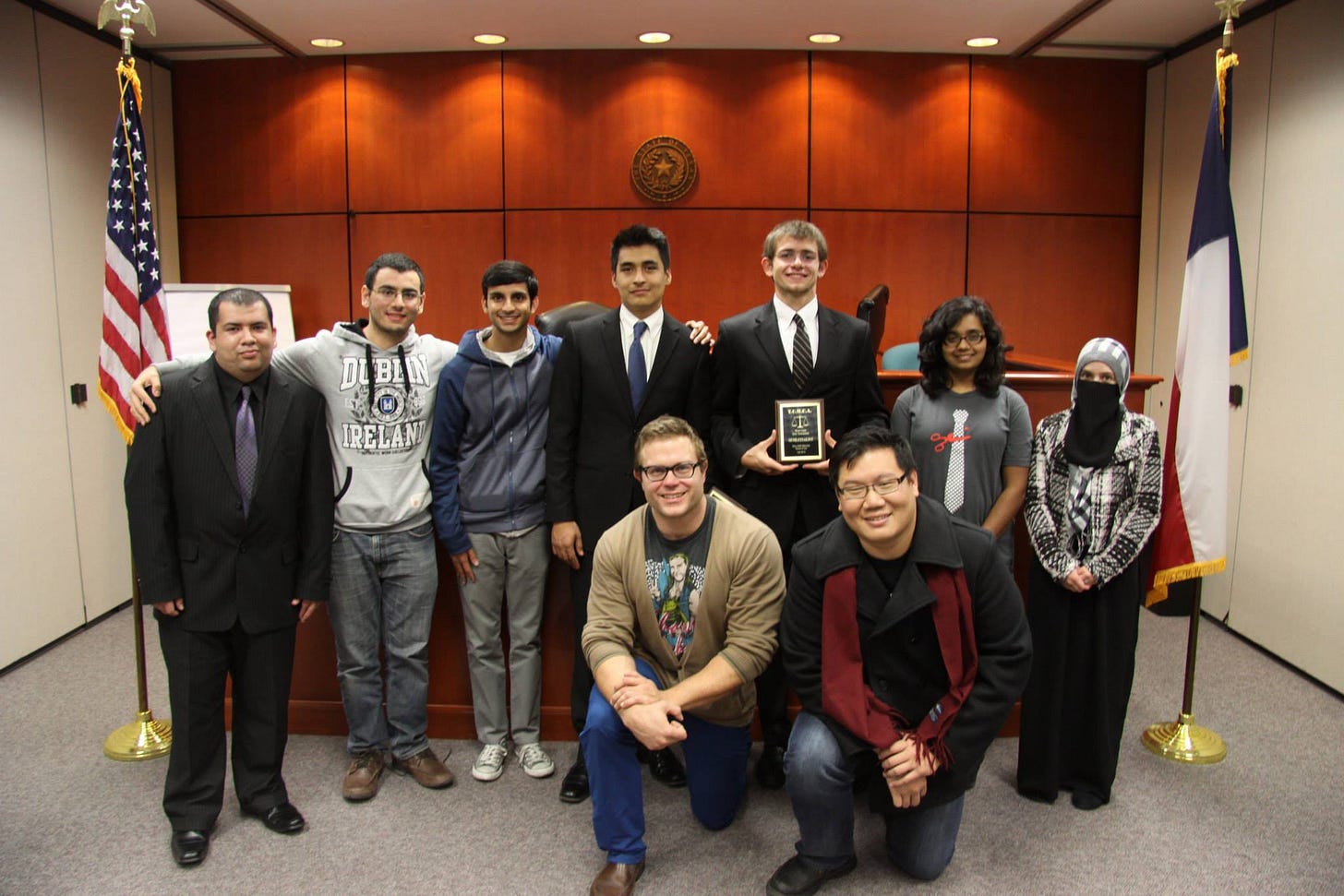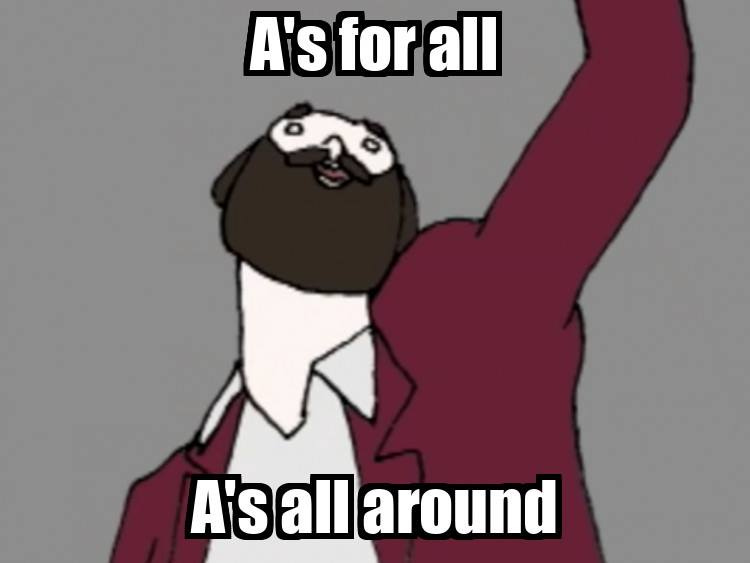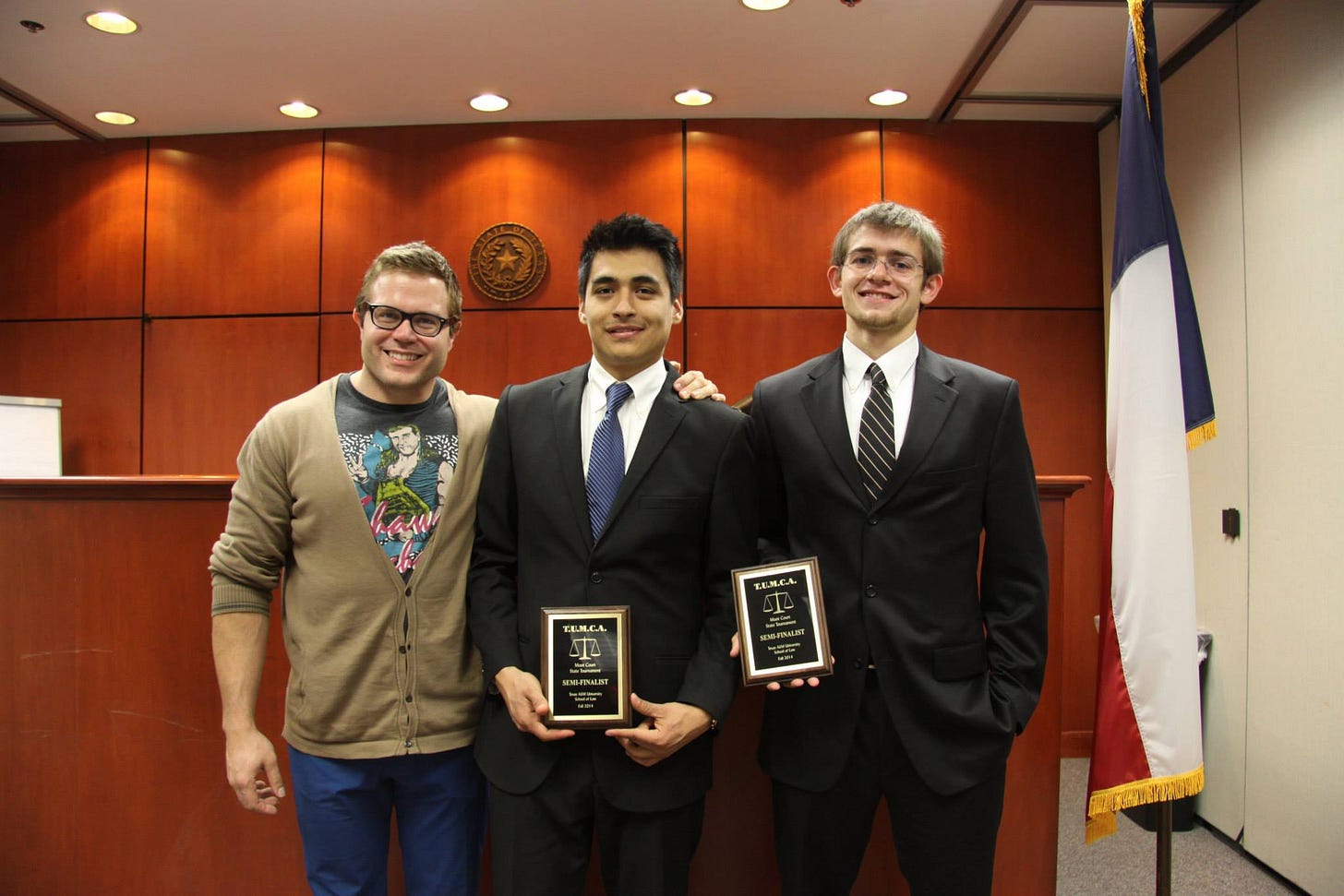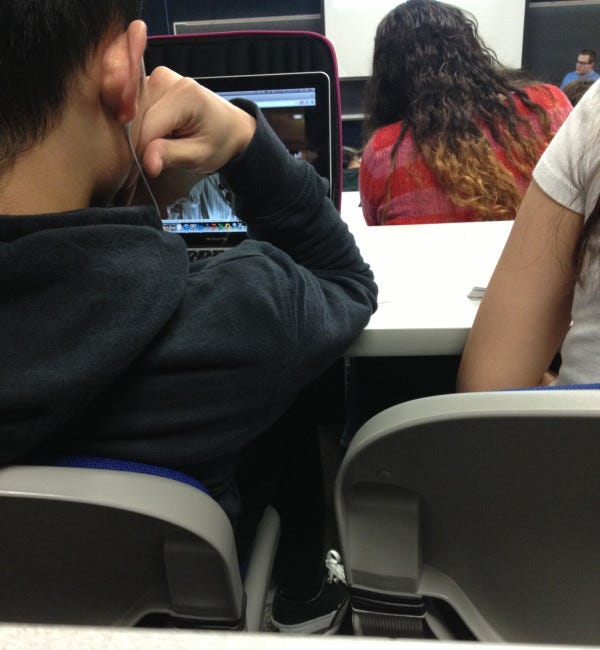The Work of Saving Higher Education
After a decade spent giving every student-customer an A, I'm now demanding something better: ruthless, face‑to‑face thinking on the spot
I pushed my chips to the center of the table on a rain‑soaked April morning in 2015, halfway through a “young tenure‑track faculty breakfast” thrown by the president of the anonymous commuter university where I taught. We were supposed to beam with gratitude, sip burnt coffee, eat dry pastries, and describe our research in soothing tones so that the goateed man in the puffy, too-tight suit at the head of the table could nod his approval while rambling about the school achieving “Tier One” status, whatever that meant (I still don’t know).
When my turn came, I set the research spiel aside and spoke about fraud. Online classes, I said, were a taxpayer swindle — seventy auto‑graded quizzes, legions of graders hired for eight hundred dollars a term, a diploma mailed out at the end if the loan money cleared via programs that existed solely to mash together 200 random credits into a degree in “University Studies.”1
We should scrap all that and judge learning only by what a student could do in a locked room with no notes, no laptops, no glowing comfort of the search bar. The room fell silent. The president, later pushed out for taking kickbacks from the very vendor running those online courses, smiled a bloodless smile and thanked me for my “passion.” The breakfast resumed. I figured I had wrecked what was left of my academic career. Oddly, I felt free.
I had joined the profession in the usual earnest way: youngest in my family to finish college at 19, most first-place grades in my law school, Ph.D. at 28, tenure‑track at 29. Though cynical by inclination and upbringing — my dad was a car dealer, after all — I believed at least some of the brochure copy about higher learning and the soft glow surrounding phrases like “life of the mind.”
In my first years I gave almost every student an A, wrote in The Atlantic that grades were a joke, and told myself I was helping customers trapped in a crooked carnival game. My course evaluations sparkled; the dean praised my “student‑centered ethic;” that article from The Atlantic turned up in the university magazine. Yet each semester I felt more like a concierge hustling visitors through a wax museum. The phrase “life of the mind” sounded like the subject line for some Nigerian e-mail scam.
The bright spot was moot court.2 I recruited two local attorneys — neither one a professor, just sharp, hungry lawyers who liked a challenge — and we built a team of first‑generation students, most of them children of immigrants. No curve, no clunky Canvas or Blackboard page, no bailout. Practice was a closed room where you stood, answered questions you did not expect, and learned to think on your feet or go home. We won tournaments. One kid earned a full ride to Harvard Law, another to Virginia. Their families cried at banquets. Those evenings showed me what school could be: a forge, not a spa.
The rest of campus was an enshittified assembly line. Our online nursing program let a vendor sift applications, admit almost anyone, and rake in fees. Adjuncts graded piles of quizzes at night for pennies. Professors recorded laptop lectures to empty rooms, then walked across campus to lecture in person to other half‑sleeping crowds. My course roster swelled to four hundred. I watched the students watch their screens. During one lecture a boy in the third row binged four episodes of Breaking Bad. A friend visiting the class asked afterward why I was not doing something meaningful with my life. I heard the question echo whenever I unlocked my office door.
The Work of Academia
Oliver Bateman and his old high school classmate and friend Lura Forcum talk about why they loved leaving academia.
So I walked away — first from the university, then from the whole gentle lie I had helped sell. I wrote op‑eds, gave talks, and poked fun at the idea of rigorous online learning by jokingly inventing “Academic Autopilot,” an AI that writes and grades every paper so that neither students nor professors have to think. Out in the world I saw the same hustle repeated: university billboards along the interstate, cheerful jingles on late‑night radio or doing major sporting events, every one promising that an easy degree equals a new life. Meanwhile student loan debt ballooned past $1.7 trillion, completion rates sagged, my faith-based law school closed its doors,3 and ChatGPT and its competitors became the beloved ghostwriter for thousands of last‑minute essays.
I used to shrug and say the system was too broken to fix, so the least I could do was refuse to harm students with low grades. That was cowardice disguised as kindness. I see that now. A soft A grade does not spare anyone pain; it only postpones it, like freezing a toothache or beloved animator Walt Disney with ice water. If we want to save what is left of higher education we must make school hurt again — clean pain, earned pain, the pain of failure in plain view followed by the rough elation of real improvement. We need ruthless intellectual aggression inside rooms guarded against every crutch the digital age can or will provide.
This is about facing the truth about American higher education. Contrary to the recent viral narrative, ChatGPT didn't destroy academia. It merely delivered the final blow to a hidebound, homework-heavy system that had gone corpse-cold long before Allan Bloom lamented The Closing of the American Mind. Rich kids and mandarins have been cheating for centuries. Now they use AI. But they were always using human ChatGPT — people like me, a veritable ChatBAT, who wrote their papers, who took their tests.
The fake academic enterprise has been a slow-motion disaster for decades. We see it in students watching TikTok makeup tutorials and mukbangs during lectures. We see it in the meandering, mediocre, and meaningless papers they produce that an AI can now generate in seconds. We see it in the abandoned intellectual life that university was meant to nurture.
The solution isn't more oversight. It isn't asking students to cite their ChatGPT use. It isn't scanning eyes with proctoring software. That's all security theater.
The only real solution is blood on the floor.
By which I mean: If school is going to survive, it must be limited to what can only be done in person, with humans, in the same room, with no devices — thinking fast and slow on the spot.
That's why our UTA moot court team sent kids to law school at places like Harvard and Virginia. Because the attorneys and I chewed them up in practice. We made them reason their way to answers. We made them think hard. We made them hurt. We made them better.

If you can't argue with an appellate lawyer, if you can't engage in dialectical discourse with a philosopher, if you can't play your instrument in front of a virtuoso, if you can't draw on the spot with a master designer — then there should be other paths for you. But not school.
School should be the place where thinking happens in real time, under pressure, with a minimal safety net. Closed-book debates, discussions, performances, practice, testing. No Internet, no phone, no cheating glasses, no Neuralink devices crudely shoved into the brain of some chimpanzee or humanzee, no time to consult the machine. Just you and your mind against the problem.
Cruel? Hardly. The layoff-happy workplace is crueler. The deep pockets-biased courtroom is crueler. The emergency ward at three a.m., the front line of a network under cyber‑attack, the first rehearsal with a conductor who missed lunch — these places do not let you consult Reddit for the answer. Closed‑book debate, unscripted performance, live problem‑solving under mild stress: that is how we widen the gap between human thinking and synthetic regurgitation.
Will such rigor privilege students like me, the fast readers, the quick talkers? My mother never tired of reminding me that my peers shouldn’t have to compete with a great big fat boy who inhaled books the same way he inhaled sleeves of Oreos. She was dead wrong. In moot court, our best speaker grew up translating for his parents at an Indian restaurant. English was his third language, yet after six months of hard drills he destroyed polished private‑school kids who had never been questioned past bedtime. Talent counts, but appetite counts more, and appetite wakes only when a meal appears just out of reach. Give me the tired, hungry kids willing to recite Andrew Marvell and William Blake in exchange for all three sleeves of Oreos.
Nor am I calling for an ivory tower that serves only the to-the-manner-born‑brilliant. Let community colleges keep expanding solid trade programs; let boot camps teach Python at record speed; let apprenticeships revive the old union pride of mastering a craft. A revitalized, hard university would be smaller, cost less, and offer fewer majors. You would not enroll to drift for four years and discover yourself; you would apply when ready to prove yourself. Fail the entrance gauntlet? Work, read, try again next year. A degree from such a place would matter because earning it would require public victories: debates won, designs executed, thought experiments defended before a panel that does not hand out mercy points.
Cheating would wither. Until those Neuralinks are perfected and the chimps stop dying, AI cannot whisper answers during a live cross‑examination. Ghostwriters cannot stand in at the drawing easel. A phone left outside cannot feed you the next line of Edna St. Vincent Millay while the seminar waits. Yes, students might game the system by rehearsing likely prompts, but rehearsal is learning, and the prompts will change. Memory and agility — once prized, lately forgotten — would return to honor.
Grade inflation? Impossible. The room decides, every day. If the class standard slips, graduates crash in the real world and embarrass the school that stamped them. Reputation, not marketing, becomes the currency. Alumni can finally speak plainly, the way I can about my balls-to-the-wall home school experience:4 I survived that place, and the resulting strength of strength I forged there was worth the scars.
What about research? Let specialized institutes handle it, as in the 19th century. The Clark Kerr multiversity model that grafted scholarship, dorm life, varsity sports, and mass credentialing into one lumbering beast has lost its way. A stripped‑down college would focus on formation: at its core, turning eager minds into sharper ones. Laboratories and institutes still thrive, but under different roofs, funded directly for the work they do instead of siphoning tuition money from freshmen who will never step inside them.
Such change sounds radical only because we have forgotten that universities once looked exactly like this. Bologna’s law students hired and fired their professors. Oxford began as a fraternity of scholars who met above a clothier’s shop. The tiny colonial colleges of early America required students to recite passages from Cicero before dawn and dispute theological theses at noon. Thomas Aquinas, the fabled cynosure of intellectual achievement in the 13th century, allegedly memorized half the western canon. The floor was the hard-nosed scholastic scribe who could keep up with people like him in debate. We lowered that floor until it touched bedrock and called it inclusion. Turns out my Silent Generation dad was right and my schooled-in-the-sixties educator mom was wrong: Inclusion without exertion is condescension.
The critics will bark: You want to slam doors in faces, prop up privilege, turn back the clock. Listen to the real clock, the atomic clock. It is already running out on the current scheme. Birth rates are falling; applicant pools are shrinking; families know a racket when they see it. It is hour of the time and our enemies are wielding silent weapons in their quiet wars against us. Another decade of debt‑fueled bloat and most of the colleges will collapse on their own, leaving students stranded. Better to rebuild now, when we can still choose the design.
Such a blueprint demands courage. Presidents must look donors in the eye and say the climbing walls, massage tables, pickleball courts, therapy cat cafes, and struggle sessions are closed. Trustees must vote no when consultants promise miracle enrollment spikes. Legislators must fund fewer seats but fund them fully. And teachers — especially teachers! — must stop guarding their students’ comfort. In retrospect, every professor I ever admired loved the game of questioning more than the silence of certainty. They should feel at home in this rough new arena.
Identity and purpose. I have spent years wrestling with both. Identity is the badge students pin to their backpacks: future nurse, marketing major, honors scholar. Purpose is what stirs when that badge falls off. My badge, slapped on me by the mentors who marketed me, read Beefy Young Historian of the Working Class. I lost it somewhere between the seventh and eighth hundredth smartphoned-in essay on the Triangle Shirtwaist Fire.
Purpose arrived later, hiding inside the nervous grin of a sophomore from Karachi preparing her first oral argument. Her hands trembled, voice cracked, but she never stepped back. We worked through the night, chopping lines, punching transitions, rehearsing counters. Two months later she stood in a law school courtroom and improvised a reply so crisp the volunteer judges laughed in delight. That moment, not my publication list, is why I taught. It is why I write this, why I’m still doing the work.
I want that chance for every student fearless enough to stand up and fail publicly. I want professors to feel the spark again when they walk into a room that might turn against them. I want parents to see a tuition bill and know exactly what their child will battle in return. And I want taxpayers to fund victory, not vacancy.
So here is my last wager, bigger than the breakfast bet of 2015. Shut off the Wi‑Fi, lock the doors, throw one sharp problem on the board, and say: Prove yourself. Some will freeze. Some will falter. A few will be tempered like steel in one of Carnegie’s factories. They will leave the room taller and straighter, and the world, watching, will remember why school exists.
That's what education should be. Not a product to be purchased, but a challenge to be met. Not a credential to be acquired, but a transformation to be undergone.
If you've got what it takes, we'll take what you've got.5
“It has been my life, it has been my entire love, it has been everything to me, and I promised myself that I would not be good, that I would be the best. It was the most important thing in my life, to be the best, to let my father be proud of me.” — Terry Funk
A deceptive title, to be sure. This was just a glorified general studies degree, not a degree that meant one had spent years studying the history and evolution of the university (I taught that actual seminar). Online schools like Western Governors and Southern New Hampshire, led by cunning administrators like Marni Baker Stein, have perfected the practice of fashioning these framed Frankenstein certificates in exchange for tens of thousands of dollars in student loans.
The other bright spot was the World Class Championship Wrestling photo exhibition I curated for the library’s special collections, which was among the best-attended and best-publicized such event in the history of the school.
I wrote about that for The Atlantic, too. Gotta get yours before you get got!
You haven’t lived until you’ve had to debate all 300 bearded weird pounds of your old man, who is bound and determined to teach you how to argue and how to sell, on the merits of Marvel’s “Acts of Vengeance” crossover or the greatness of Hulk Hogan’s feared opponent John “Canadian Earthquake” Tenta. Little did he know — actually, come to think, he did know, if one goes by his own later-in-life writings — that you’d make thousands of dollars just writing about the Canadian Earthquake. The more you know, am I right?
And if you don't, there's always ChatGPT. As you make your way to the emergency exit, don’t let the door hit you where the good lord split you.








An energizing and powerful statement. I wonder how this experience - even with your thoughtfully proposed solutions - can be made accessible to the students that have to work full time. I was able to relish in this challenge of deep thinking and spirit of doing it the hard way by my own ambition (even if certain class structures and professors allowed and enabled the comfortable route), but it was also enabled by the time I had available to me to do the extra work, to spend the time being curious and turning over the material, to write long essays from scratch.
For those who may be taking care of family, working a full time job - to survive, not just pay for school - they may not be taking the easy route in response to the allure of comfort, but instead because they are under the much weightier pressure of getting by. Critical thinking and deep understanding often take time. Curiosity, creativity and analysis are encouraged by certain kinds of invigorating pressure - the threat of a room turned against them, reputation, success - not necessarily the pressure of a lack of sleep or making rent.
I couldn’t feel more fully the disappointment in the trade too often made of true academic rigor for comfort, and I champion your point fully, especially for those with the ability to spend the time and energy doing the work. But I think it’s an important element to acknowledge those whose time and energy is consumed by trying to keep the lowest rung of Maslow’s hierarchy of needs intact.
Alas, perhaps this argument is better directed at our broader society, rather than higher education.
Absolutely electric. This is the kind of truth-telling that scorches the earth around the hollow cathedral of credentialism.
I agree — the real university must return to the arena. But here’s the twist: I say embrace AI. Use it to learn, to rehearse, to sharpen — but not to hide. Let it be your sparring partner, not your mask.
Because in the end, the proving ground must be human as you point out. No devices, no ghostwriters, no second chances. Just the raw collision of intellects — teacher and student, student and student — in a room where souls meet through dialogue, challenge, and fire.